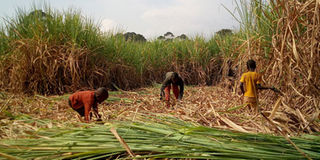Prime
Activists push for stricter legislation against child labour in Uganda

Some of the children found working on one of the sugar cane plantation during school time in Luuka District recently.
What you need to know:
- Despite the laws and measures put in place by Uganda, the above statistics clearly show that the practice of child labour still prevails.
As Uganda commemorates World Day Against Child Labour, rights activists have called on government to tighten policies and legislation against abuse of child rights.
The Minister of State for Gender and Culture Affairs, Ms Peace Mutuuzo who, on Wednesday, presided over the ceremony at Madibira Primary School playgrounds in Busia border town said child labour denies children their right to childhood, a good education and growing up in a safe and protected environment free from harm.
“Children shouldn’t work in fields, but on dreams,” Ms Mutuuzo said.
According to her, there couldn’t have been a better venue than Busia border town where the prevalence of child labour is alarming because of the cross border trade that has not spared the children.
Children are often seen carrying heavy merchandise across the borderline, many times sent by adults in return of some commissions.
“Our choice of venue is intended to raise the profile of our fight against the vice of child labour in this area but also the country at large,” Ms Mutuuzo said.
However, human rights activists argue that despite several legislative policies by the international community and the government of Uganda, child labour continues to be prevalent.
Globally, it is estimated that 211 million children between the ages of 5-14 years and a further 141 million aged 14-17 are involved in some form of economic activity.
From the 2018 Statistical Abstract conducted by Uganda Bureau of Statistics (UBOS) for 2016/2017, Child labourers increased to 2,055,000 up from 2,009,000 over the 2011-2012 period with over half of the children doing hazardous work.
The number of children doing hazardous work in urban areas is higher than those in rural areas.

Students march during celebrations to mark World Day Against Child Labour at Madibira Primary School playgrounds in Busia border town on June 12, 2019. COURTSY PHOTO
Authorities recently said at least 10,487 children have been withdrawn from child labour in different parts of the country as they were doing hazardous work on tobacco farms, gold mining sites as well as tea and rice growing firms between 2017 and 2018.
“However, there was no account of how the businesses and companies which were perpetrators and beneficiaries of this harmful practice were brought to book by the responsible government agencies,” says Mr Derrick Lutalo, the project officer, Consortium on Corporate Accountability (UCCA).
In a recent study by UCCA on the effects and impact of sugar production on communities in Luuka District in eastern Uganda, child labour was found to be one of the dire effects of sugarcane growing.
“Children—especially those working on out growers farms were found to be exploited working on these farms as both planters and harvesters a chore that affects their development and access to education. The local government and School management authorities both confirmed that there is a heavy school dropout and that even those that go to school often escape in afternoons to go work on sugarcane plantations,” Mr Lutalo said on Wednesday.
He advised that in order to eliminate child labour completely, there is need for cooperation between the government and business entities to ensure respect and protection of the rights of children.
“The government also needs to ensure that business entities found engaging children in child labour remedy their actions by compensating and rehabilitating the children, and to also strictly enforce the laws relating to child labour and ensure effective redress mechanisms for the victims of child Labour. This will go a long way in ensuring the total elimination of child labour in Uganda and enhance corporate accountability,” added Mr Lutalo.



